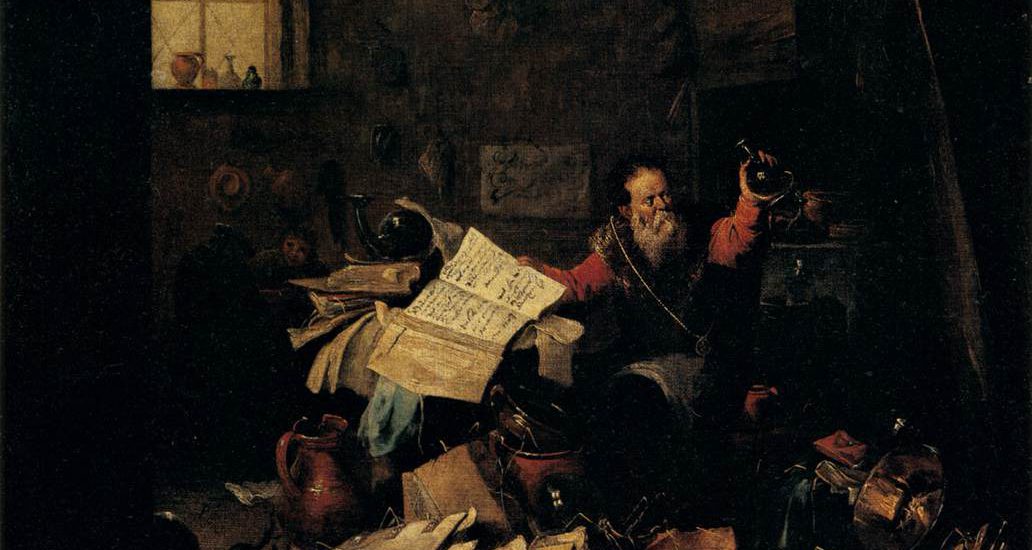Not to worry, I know exactly what I’m doing… you may want to stand back.
– Master Alchemist Casilda of Kurun
Symbaroum is one of those systems that seems very easy to break in many interesting ways. There is a multitude of ability combos that make characters ramp up in power dramatically, and that has led a lot of people to consider the system unbalanced. Personally, I don’t think that roleplaying game systems necessarily need to be balanced – at least not in terms of character power level. However, I do think systems need to be balanced in the sense of how much fun a player receives from an investment compared to another player.
And that is where Symbaroum’s balance is often lacking.
As previously explored in my article on the Witchsight ability, I feel compelled to adjust abilities that simply seem like a bad investment. In my tweak, I didn’t specifically try to make the ability more powerful, but I tried to find a way to make it more reliably engaging and fun to use. There are a few other abilities in Symbaroum that strike me as more or less unfun, and one of those is Alchemy.
The Problems with Alchemy
First of all, it’s very easily a dead ability. The ability says it provides one use per adventure. Judging by the Copper Crown adventures as examples, that means an Alchemist might be looking at one roll per every three to five sessions, and if you fail the roll you get nothing. All the experience you invested into the ability is now dead weight until the adventure is over. It’s not impossible for a player to fail several rolls in sequence. Imagine having 10, 30, or 60 XP tied in an ability and you fail your single roll to use that ability in every adventure. Even if you have 15 Cunning that’s a 25% chance that your character falls behind everyone else for the rest of the adventure. If you also invest into Exceptionally Cunning to bring your attribute all the way up to 18, you still have a 10% risk that your 120 precious experience is mostly wasted. Sure, the ability has an ancillary function to investigate poisons and substances, but that function seems to niche that it’s bound to be irrelevant unless the GM specifically designs investigative avenues for it – so I take it as mostly irrelevant.
Second: You have to predict your needs. The way the ability is written, the character needs to take time to prepare the elixir. So it’s not something that can be done in the heat of the moment. So you have to hedge your bets and make the elixirs that have the broadest or most assured applications. Herbal Cure is a much better bet than most other Novice elixirs simply because it will always come in handy.
Third, and relatedly, most of the elixirs are extremely situational. So this leads to some elixirs probably never being used. The sheer compounding of restrictions on this ability means that many elixirs may simply never be worth making.
I’ve seen some suggestions on how to fix it, like allowing it to be used once per session, or putting more effort on gathering specific ingredients for the elixirs, etc. but personally I’m not a big fan of arbitrary “per-session” functionality, and at higher levels it would make a successful Alchemist ridiculously powerful. Tracking specific ingredients also feels like it would make it even less entertaining because I loathe bookkeeping. Tracking ingredients would add an immense amount of details for both GM and players to keep straight. (Imagine having to invent ingredient lists for every elixir, detailing how much every ingredient costs or where it can be harvested, then tracking player progress on elixir assembly. Might seem appealing for some GMs and players, but to me it seems anathema to the rest of Symbaroum’s lean and ambiguous ruleset).
The house version of Alchemy I’ve proposed to my players revolves around the use of a deck of cards representing all the elixirs the Alchemist can make. The ability is still limited to once per adventure, and is still a Cunning check to make a specific elixir of your choice, but it can be done at any time – being a test to see if the character has the foresight to make the elixir for that particular situation. If you succeed you search your deck for that elixir and add it to your equipment. However, if you fail… you shuffle the cards and draw a random elixir.
This means that Alchemy always gives you something. If you fail, the highly situational nature of elixirs probably means that what you got isn’t going to help you solve your current problem. However, it means you now have an item that could be powerful if you can find a use for it. This will encourage players to approach problems from new angles and to think on their feet. Basically it gives a bit of “mad science” feeling to the ability.
Also, the list of elixirs the Alchemist can make are limited according to the “Secrets of the Traditions” from the Player’s Handbook (with some tweaking), limiting access to some of the more ridiculous elixirs the game provides.

Alchemy (Revised)
The character is schooled in the mysteries of alchemy. They spend their time cooking together strange elixirs and mystical concoctions to help themselves and their allies brave the dangers of Davokar. Every mystical tradition has its own recipes for elixirs both helpful and harmful.
In problem-solving situations, Alchemy can be used to identify drugs and poisons or chemical ingredients, and to gain clues as to where they come from. Other than that, the character can roll Alchemy once per adventure at any point to see if they have had the foresight to prepare a specific elixir.
Novice: Special: The character knows all the basic novice elixirs as well as any secret novice elixirs of their mystical tradition. With a successful roll of Cunning they can produce a single dose of a novice elixir of their choice from among the recipes they know. If the roll fails, they gain a single dose of a random elixir from their recipe list.
Adept: Special: In addition to their novice knowledge, the character knows all the basic adept elixirs as well as any secret adept elixirs of their mystical tradition. With a successful roll of Cunning they can produce an adept elixir of their choice or 1D4 doses of a novice elixir of their choice. If the roll fails, they gain a single dose of a random elixir from their recipe list.
Master: Special: In addition to their novice and adept knowledge, the character knows all the basic master elixirs as well as any secret master elixirs of their mystical tradition. With a successful roll of Cunning they can produce a single dose of a master elixir of their choice from among the recipes they know, or 1D4 doses of an adept elixir of their choice, or 1D6 doses of a novice elixir of their choice. If the roll fails, they gain a single dose of a random elixir from their recipe list.
Alchemy Recipes
Basic Elixirs
Novice
Flash Powder
Knocking Bolt
Poison (Weak)
Candle of Clarity
Waybread
Antidote (Weak)
Seeking Arrow
Herbal cure
Adept
Drone Dew
Elemental Essence
Poison (Medium)
Poison Candle (Weak)
Choking Spores
Antidote (Medium)
Antidote candle (Weak)
Magic Concentrate
Smoke Bomb
Protective Oil
Ghost Light
Eye Drops
Master
Wraith Dust
Poison (Strong)
Poison Candle (Medium)
Life Elixir
Antidote (Strong)
Antidote Candle (Medium)
Spore Bomb
Secret Elixirs
Wizardry
Adept: Alchemical grenade
NAM: Alchemical trap
Master: Thunderball
Master: Thistle Tincture
Witchcraft
Adept: Transforming brew
Adept: Thorn-crawlers
Novice: Wild Chew
NAM: Purple sap
Theurgy
Adept: Holy water
Symbolism
Novice: War-paint
Sorcery
Master: Wraith-vapor
Adept: Shadowbleach
Novice: Homonculus


Not bad.
Since i played The witcher i find alchemy interesting.
I like the idea behind it, and I think that once per adventure is enough to give the players an edge in certain situations. How do you determine the random elixir they get?
I just found a Randomizer App. You can make a list of things and it just randomize one out of the list. It could be useful. if you get the ritual they want, just random again,
Where did you get the illustrations for the cards? I like this idea a lot and I’m looking forward to adding it to my games.
They’re medieval woodcuts for the most part. You can find a lot of old medieval illustrations online free of use
Thanks! Didn’t really knew what to google for this type of illustrations
I gave a time on making Alchemicals as a housrule. It took a quarterday to make a dose (6 hours) if you had ingrdients.
It have worked well in our group.